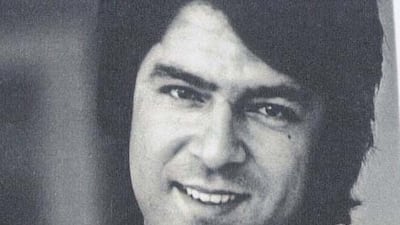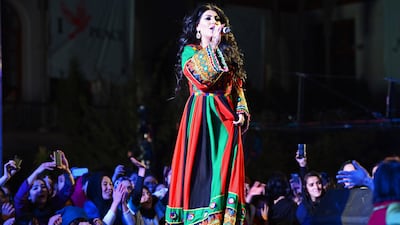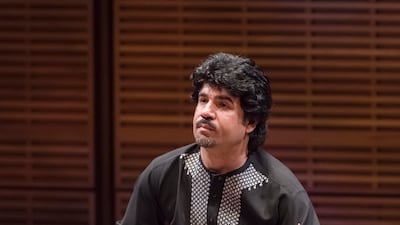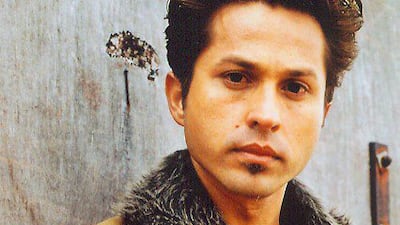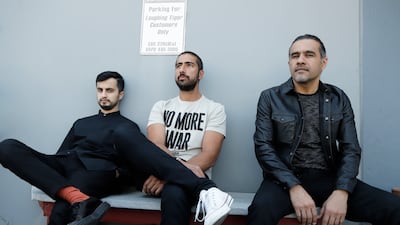For more than 50 years, Afghan musicians and singers have produced works reflecting the diversity of their homeland.
From the traditional folk of Mahwash and the classic pop of Ahmad Zahir to the modern sounds of Aryana Sayeed and ferocity of rockers Kabul Dreams, Afghanistan's music industry is as vibrant as it is soulful.
However, with the Taliban now in power in Afghanistan, will their policies allow the country’s music scene to play on?
Here are 10 Afghan artists you need to hear:
1. Ahmad Zahir
Dubbed Afghanistan’s Nightingale, Zahir has remained a household name since his death in 1979.
The son of former Afghan prime minister Abdul Zahir (1971 to 1972), Ahmad had a privileged background that allowed him to travel across the US and Europe. He incorporated the musical styles of the two countries into his Dari-sung tracks.
As a result, Ahmad found success with upbeat pop hits and ballads, such as Soltane Qalbam Tu Hasti and Zeba Negaram, which featured local instrumentation with western sounds including rock and French chanson.
In news that shocked the country, Ahmad was tragically killed in 1979 in a car accident aged 33.
During the Afghan Civil War in 1996, the Taliban reportedly destroyed his grave, only for it for be restored by fans in 2003.
2. Mahwash
As the rare female artist referred to in Afghanistan with the honorific Ustad (meaning master), Mahwash remains one of the country's most revered singers.
Born in a conservative family – her mother was a Quran teacher – Mahwash kept her vocal talents hidden until she finished her university studies.
After a well-received performance singing on Kabul Radio, Mahwash went on to study under various local musical luminaries and recorded popular folk songs including O Bacha (Oh Boy).
With Afghanistan descending into civil war, Mahwash relocated to the US in 1991.
3. Aryana Sayeed
One of Afghanistan’s most celebrated pop stars, Sayeed sings in Farsi, Dari and Pashto.
She was born in Afghanistan and moved to Pakistan with her family when she was a child, before settling in Switzerland.
Buoyed by the success of 2008 debut single Mashallah and 2011's Afghan Pesarak, she moved back to Afghanistan where she became one of the leading lights of the pop scene.
Sayeed was one of the hundreds who escaped the country on a US cargo jet bound for Qatar, fleeing the country's takeover by the Taliban.
4. Mozhdah Jamalzadah
A ubiquitous presence on the airwaves, Mozhdah Jamalzadah, 35, has been dubbed the "Oprah of Afghanistan”.
This is down to her carving out an impressive career as a pop star and host of popular television talk show The Mozhdah Show.
Born in Kabul, she moved to Canada at the age of 5, with her family, where she went on to study journalism and dabble in songwriting in her early twenties.
Her breakout single was 2009’s Dokhtare Afghan (Afghan Girl), which became a hit back in Afghanistan.
The song's success, coupled by her academic background, resulted in Jamalzadah being offered a job with fledgling Afghan television station 1TV.
Upon moving back to Kabul, she focused on both careers and went on to become the first Afghan woman to perform at the White House in 2010 for then-US president Barack Obama.
In 2019, Jamalzadah released the memoir Voice of Rebellion.
5. Naghma
If you are looking for an authentic slice of Afghan folk music, then Naghma (full name Naghma Shaperai) is the gold standard.
Naghma first made a name for herself in the 1980s singing with her ex-husband Mangal. She found success as a solo artist with original tracks and folk standards sung in Dari and Pashto, including hits Mazidgar De Ka Nade and Mohabbat.
Since 2000, Naghma has been residing in California in the US.
6. Homayoun Sakhi
A key feature of traditional Afghan music is the lilting sound of the rubab, a lute-like instrument traditionally made from the trunk of the mulberry tree.
Sakhi is considered a master of the form and ever since moving to the US has been serving as an unofficial ambassador for the instrument with a series of albums and compilations including The Art of the Afghan Rubab: Music of Central Asia Vol 3 (2006).
He also teamed up with singer Mahwesh and acclaimed world music producer Dawn Elder for the 2013 album Love Songs for Humanity under the name Voices of Afghanistan.
7. Ensemble Kaboul
Known for accompanying Mahwash on international tours, Ensemble Kaboul is no mere backing band.
Formed in Switzerland in 1995, the group is made up of Afghan exiles who fled to Europe over the past three decades.
Led by rubab maestro and composer Khaled Aman, the group has toured and released albums, including the well-received 2001 debut Nastaran, representing the traditional and popular sounds of Afghan music.
8. Farhad Darya
Darya's ability to sing in his native Dari and Pashto, in addition to Uzbek, Hindi and Urdu, has garnered him a regional fan base.
That said, his songs, extolling Afghan tradition and patriotism, have also made him a major star at home.
His four-decade career began with him fronting successful band Goroh-e-Baran (alongside '80s Afghan pop star Asad Badie) before he eventually went solo.
Through his 19 albums, including 2003's Salaam Afghanistan, Darya's songs promote messages of peace and solidarity for his homeland.
He currently resides in the US.
9. Nasrat Parsa
In a career tragically cut short, Parsa made a fan of superstar Ahmad Zahir. Parsa was aged 7 at the time.
Upon hearing the youngster's voice on the radio in 1975, Zahir reached out to his family and invited Parsa to perform with him in a concert.
With the advent of the Soviet occupation, Parsa fled to India in 1981, where he studied Indian classical music.
He later blended Afghan and Indian music traditions when he resettled in Germany and launched his music career.
He released albums in Dari and Hindi, including 1998's Saya and Hindi Songs (2002), respectively.
Parsa was killed in 2005 in a reported scuffle with a group of men after a Vancouver concert. He was 37.
10. Kabul Dreams
Since forming in the Afghan capital in 2008, Kabul Dreams’ brand of fuzzy garage rock and do-it-yourself ethos garnered them a loyal following at home and abroad.
In addition to well-received albums Plastic Words (2013) and Megalomaniacs (2017), they toured Europe and the US, including performing at the influential South by Southwest festival in Texas.
Constant death threats from Taliban sympathisers forced the three-piece to flee Afghanistan in 2013 and seek asylum in the US.
Out this month, their latest track is the politically charged Butcher of the City – the title being a veiled reference to brutal former Afghan warlord Gulbuddin Hekmatyar.
